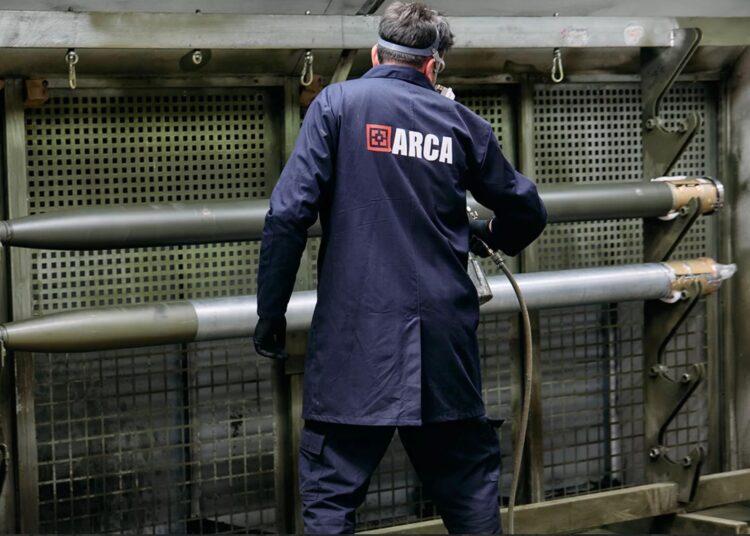Abdullah Bozkurt / Stockholm
A US-indicted Turkish defense contractor and former military officer, whose rapid rise in Turkey’s arms industry was fueled by close ties to the government of President Recep Tayyip Erdogan, has managed to escape US federal bribery charges following what many observers believe was political lobbying in Washington by Ankara.
The case, which accused him of manipulating NATO contracts in exchange for secret payments, was quietly dropped on July 9 by the US Department of Justice (DOJ) just days after a high-level meeting between Erdogan and US President Donald Trump during a NATO summit in The Hague held June 24-25.
The saga of İsmail Terlemez, once a technical insider at NATO’s Support and Procurement Agency (NSPA), exposes how political influence and geopolitical bargaining can upend international corruption investigations and how a Turkish operative accused of bribery inside NATO’s most sensitive procurement system emerged instead as one of Turkey’s fastest-growing arms exporters. La Lettre, Le Soir, Knack and Follow the Money were first to publish on this.
The US indictment, filed in the Northern District of Illinois, accused Terlemez of accepting €115,896.74 in bribes from Scott Everett Willason, an American defense consultant. Prosecutors alleged that the two colluded between 2019 and 2020 to rig NATO tenders, including contracts for the US Army’s TNT supplies, by exploiting Terlemez’s insider position at the Ammunition Support Partnership, the NATO division responsible for collective arms purchases.
Based in Capellen, Luxembourg, NSPA serves as the alliance’s central logistics and contracting arm. With 1,550 employees and over 2,500 contractors in NATO’s missions around the world, it manages procurement, logistics and maintenance operations across all NATO missions. The agency handled €3 billion in contracts in 2023, a figure that surged to €7.4 billion in 2024, reflecting a dramatic expansion of NATO’s defense supply network in a single year.
In 2025 NSPA has already directed more than €2.8 billion worth of contracts to industry, covering everything from naval fuel and battlefield communications gear to Patriot-class air defense missiles as part of an ongoing multibillion-euro procurement surge that began in 2024.
Following the June 2025 NATO summit, member states agreed to raise defense spending targets to 5 percent of GDP, a move that further elevated NSPA’s role as the alliance’s most powerful procurement hub. Turkish national Levent Aksoy serves as NSPA’s principal officer for procurement policy.
That growth, however, has been overshadowed by an expanding corruption probe. In May 2025 Belgian judicial authorities confirmed that they were investigating current and former NATO staff over possible irregularities in awarding contracts for NATO military equipment. The Belgian Federal Public Prosecutor’s Office said two suspects were arrested and questioned on suspicion of corruption, money laundering and membership in a criminal organization.
The probe, coordinated by the EU’s judicial cooperation agency Eurojust, spans Belgium, Luxembourg, Spain and the Netherlands, focusing on the possible passing of confidential tender information by employees of the Luxembourg-based NSPA to favored defense contractors. Prosecutors said several current and former NSPA officials may have participated and that illicit funds were laundered through consultancy shell companies, a mechanism similar to the one outlined in the Terlemez-Willason indictment.
Dutch prosecutors also disclosed that they had arrested a former Dutch defense ministry employee at Schiphol Airport on corruption charges related to NATO contracts. The suspect was reportedly responsible for international purchase agreements and is accused of having accepted bribes in 2023 in collaboration with others, both inside and outside the Netherlands.
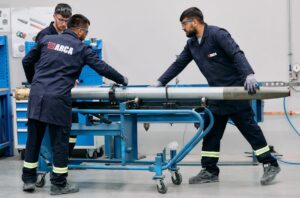
Terlemez, who served in Turkey’s army before joining NATO, was arrested on May 13, 2025, at Brussels Zaventem Airport on a warrant issued by US authorities. He was held for 59 days in Haren Prison in Belgium, while his co-defendant, Willason, was detained the same morning in Lugano, Switzerland. Both men were awaiting extradition when, without warning, the DOJ abruptly filed a motion on July 9, 2025, to dismiss all charges.
The motion, signed by Assistant Attorney General for the Antirust Division Abigail Slater and DOJ prosecutors Amanda Barnes, Conor Bradley and Alexander Diamond, offered no explanation beyond stating that “continued prosecution would not serve the interests of justice.” The next day, Judge Franklin U. Valderrama approved the dismissal without prejudice, effectively ending the case. On July 11, 2025, both Terlemez and Willason were quietly released.
The sudden reversal stunned investigators and legal experts. The US probe had been conducted jointly by the FBI and the Defense Criminal Investigative Service (DCIS), gathering financial records, email evidence and testimony from NATO personnel. Yet the entire case was dropped only weeks after Erdoan’s face-to-face meeting with Trump in The Hague, where the two leaders discussed defense spending, arms cooperation and bilateral trade.
According to the indictment, Terlemez’s misconduct began during his tenure as a technical officer at NATO’s NSPA in Luxembourg, where he had access to classified procurement documents and was responsible for drafting technical specifications and evaluating supplier bids. The US prosecutors described two major schemes.
The first involved the Italian defense company TNT S.p.A., which sought to win NATO’s TNT supply tender. Willason’s Luxembourg consultancy, Willason Defence Consultancy Sàrl., signed a contract with TNT S.p.A. on January 16, 2019, guaranteeing him a €500,000 fee per purchase order plus variable commissions based on TNT tonnage. In exchange Terlemez used his authority inside NATO to approve TNT S.p.A.’s bids as “technically compliant,” while disqualifying its competitors.
On March 26, 2019, he sent an email to US Army officials with the subject “flake TNT requirement,” attaching TNT S.p.A.’s price proposal, a move prosecutors cited as direct evidence of collusion. TNT S.p.A. subsequently transferred over €1 million to Willason’s firm between mid-2019 and mid-2020. From that sum, Willason made 11 payments to Terlemez totaling €115,896.74, wired in amounts ranging from €5,000 to €19,920.
The second scheme emerged in early 2020 when Terlemez, while on a NATO mission to Riga, Latvia, met with the CEO of Latvian ammunition manufacturer Valsts aizsardzības korporācija SIA (VAK Ltd.). He encouraged the executive to meet his “business partner” Willason, claiming cooperation “would benefit everyone.” Within days Willason contacted the Willason Defence Consultancy Sàrl and proposed a deal through his Polish firm, Defence Solutions Sp. z o.o.,, offering to assist in preparing bids for NATO contracts in exchange for half the profit margin, effectively converting NATO tenders into a personal kickback mechanism.
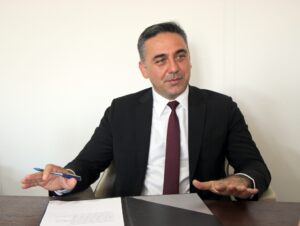
Terlemez resigned from NSPA in July 2020, shortly after receiving the last payments, and returned to Turkey. With support from the Erdoğan government, he quickly became one of the key players in the defense industry.
Terlemez’s rise cannot be understood apart from his deep ties to the Turkish Ministry of Defense and Turkey’s ruling coalition networks. A retired Turkish Army captain specializing in munitions, he leveraged personal connections to embed himself in both the far-right Nationalist Movement Party (MHP) and Erdogan’s ruling Justice and Development Party (AKP) patronage structures. The AKP and MHP jointly govern Turkey, although the far-right nationalists have never entered into an official coalition government with President Erdogan.
First, Terlemez established a company called Arca Savunma Sanayi Ticaret Limited Şirketi on August 5, 2020 with capital of TL 1,000,000 (roughly $136,000) and headquartered in Çankaya, Ankara. The company’s founding charter outlined an unusually broad scope: the design, production, modernization and export of weapons, ammunition, armored vehicles, aerospace components and other defense systems for both domestic and international markets.
The company’s stated objective was to contribute to the integration of Turkish defense manufacturing into NATO’s industrial framework, with specific reference to certifications like AQAP and AS9100, facility security clearance and ministry of defense licensing. From its inception Arca Savunma presented itself as an entity designed not only for production but also for strategic coordination within Turkey’s defense ecosystem.
Terlemez’s pivotal role in another newly established company, Nepsa Savunma Sanayi, came to light in June 2021 during a session of the Turkish Parliament, when an opposition lawmaker alleged that Terlemez had signed a private contract on behalf of Nepsa with the state-owned Machinery and Chemical Industry Corporation (MKE), amid growing rumors that the Erdogan government planned to privatize MKE.
Founded in June 2020 by Habip Taş, Nepsa unexpectedly secured a major contract just a year later, with Terlemez deeply involved despite not being listed as a shareholder. The 25-year contract reportedly included provisions for free “know-how” transfers from MKE to the private company and clauses stipulating that the agreement would remain valid even if MKE were privatized, merged or underwent ownership changes.
At the time, one of Terlemez’s chief patrons was Muhsin Dere, then deputy defense minister and concurrently chairman of MKE and the military procurement company ASFAT. Under Dere’s authority, MKE granted Nepsa rights to produce 150 million rounds of ammunition, state-backed purchase guarantees and access to 50 million empty shell casings free of charge, along with the use of an idle factory in Kırıkkale.
The deal effectively handed him state assets, capital and market access, privileges that later formed the foundation of Arca Savunma Sanayi’s explosive growth.
The trade registry filings he made on behalf of Arca, reviewed by Nordic Monitor, tells the tale on Terlemez’s engagements. In May 2022 he sold 40 percent of Arca Savunma’s shares (valued at TL 400,000) to Faisal N. M. A. Al-Kharafi, a Kuwaiti businessman, thereby ending its single-shareholder status. However, the partnership was short-lived. Barely a month later, on June 21, 2022, Al-Kharafi transferred the same 40 shares back to Terlemez, restoring him as the sole owner.
Arca soon became one of the few private companies authorized to perform “mühimmat basma” — the controlled process of loading explosives into shell casings, previously reserved for state-owned MKE factories. This unprecedented privilege transformed Arca into a fully integrated artillery ammunition manufacturer, effectively blurring the boundary between public and private defense production.
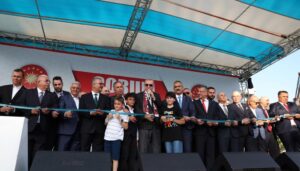
“We are positioning Çorum at the forefront of one of our country’s most ambitious sectors — the defense industry. In the Sungurlu Organized Industrial Zone, we are establishing a gunpowder, cartridge and primer production facility with an investment worth 6 billion lira.”
A public display of the government’s endorsement of Terlemez came when President Erdogan personally led the ceremony for the founding of Arca’s new capsule (primer) factory in the Sungurlu Organized Industrial Zone, a new defense-industrial area, during a ceremony on August 13, 2022. The site (about 1 million m²) has an annual primer capacity of 1.2 billion units; test production lines for mortar and artillery rounds with 144,000 rounds/year capacity; a 122 mm artillery rocket line with 24,000 rockets/year capacity; and Turkey’s first C4 plastic explosives production line.
A major transformation occurred on July 21, 2023, when Arca converted from a limited liability company into a joint-stock company (anonim şirket). Its new name became Arca Savunma Sanayi Ticaret A.Ş., and its capital was expanded from TL 1 million to TL 15 million, divided into 150,000 registered shares, all held by Terlemez.
This legal upgrade allowed Arca to enter larger procurement and export markets, partner with other defense entities and access financing instruments unavailable to limited companies. Terlemez became chairman of the board and the sole authorized signatory, consolidating control while paving the way for institutional partnerships.
In early 2024 Arca Savunma’s corporate landscape changed dramatically when it entered into partnership with SB Silah Sanayi A.Ş., an Istanbul-based defense contractor specializing in small arms manufacturing and metalworks.
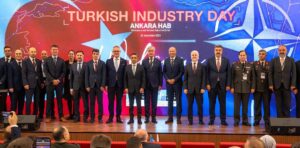
Trade filings show that in April 2024 Terllemez transferred 37,500 shares, valued at TL 3.75 million, representing 25 percent of Arca’s capital, to SB Silah Sanayi A.Ş. Founded on October 16, 2023 in Şişli, Istanbul, SB Silah Sanayi A.Ş. was established by Savaş Balçık, a former official in President Erdogan’s ruling AKP, and Leman Özgür Rodoplu.
Balçık is closely associated with Selçuk Bayraktar, Erdogan’s son-in-law, and the powerful figures behind Baykar Teknoloji as well as Bilal Erdogan himself.
Shortly thereafter, on October 10, 2024, Arca’s capital was massively increased, from TL 15 million to TL 500 million, roughly $15 million at the time, with Terlemez maintaining ownership of 75 percent and SB Silah Sanayi A.Ş having 25 percent.
In the same month Terlemez signed a $2 billion contract with Slovakia’s MSM Group during the SAHA EXPO defense fair in Istanbul, an event publicly praised by Haluk Bayraktar, CEO of Baykar and brother to Erdogan’s son-in law, who called it “the largest deal of the fair.”
While Terlemez stayed on in an executive role and major shareholder, the company’s effective control reportedly passed into the Bayraktar-Erdoğan economic orbit, integrating Arca directly into the presidential family’s network of defense interests.
Arca’s privileges extended into real estate and finance as well. In one transaction a parcel of land in Ankara valued at 149.5 million lira was suddenly reappraised at 54.9 million lira, only to be purchased by Arca the next day. Despite formal complaints alleging massive tax losses, no investigation followed — emblematic of the impunity enjoyed by politically connected defense contractors.
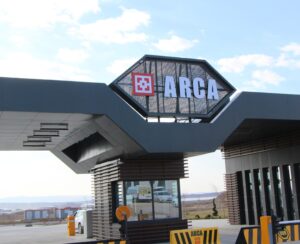
In 2024 ARCA Savunma became Turkey’s fifth-largest defense industry exporter, achieving $600 million in exports, according to figures released by Turkey’s Presidency of the Defense Industry (SSB), the top procurement agency led by President Erdogan. In July 2025 ARCA announced its acquisition of Italian ammunition manufacturer Esplodenti Sabino, one of Europe’s few companies specializing in ammunition, missile and explosives disposal, known for its NATO and Italian Defense Ministry projects, aiming to strengthen its foothold in the European defense market.
On September 30, 2025, Arca Savunma’s capital structure and management framework were further revised, consolidating Terlemez’s near-absolute control over the company’s management. In reality, however, this control existed largely on paper as the true power behind the company lies with Erdogan’s family, which has reaped enormous profits from its arms sales.
Arca’s emergence also coincided with the war in Ukraine and NATO’s scramble for ammunition supplies. As the US and allies sought to boost production for Kyiv, Ankara positioned Turkish companies as subcontractors. Amid that reshuffle Assan Savunma, a long-established munitions producer linked to former intelligence chief and current foreign minister Hakan Fidan, was abruptly dismantled on charges of espionage and terrorism. Its facilities, workforce and contracts were gradually absorbed by Arca Savunma, which seamlessly replaced it in the supply chain.
The move was orchestrated to send a clear message: The lion’s share of Turkey’s defense and arms industry exists solely to enrich President Erdogan’s family members and their political and business associates. No competition for a significant slice of that growing pie is now tolerated, even if it means Erdogan undercutting his former intelligence chief.
Taken together, these developments show Terlemez not as an ordinary entrepreneur but as an instrument of political capture, a conduit linking bureaucratic elites, nationalist defense circles and the presidential family’s business empire. His trajectory from NATO official to defense magnate demonstrates how public resources, state infrastructure and NATO-linked contracts have been funneled into a private patronage network at the heart of Turkey’s ruling establishment.
The case of Terlemez illustrates how political proximity can insulate even indicted defense figures from accountability. From NATO official to Erdoğan-aligned arms mogul, his trajectory mirrors Turkey’s broader militarization under one-party rule. His company, Arca Savunma, emerged from scandal to become a central node in Turkey’s arms exports to the world.

